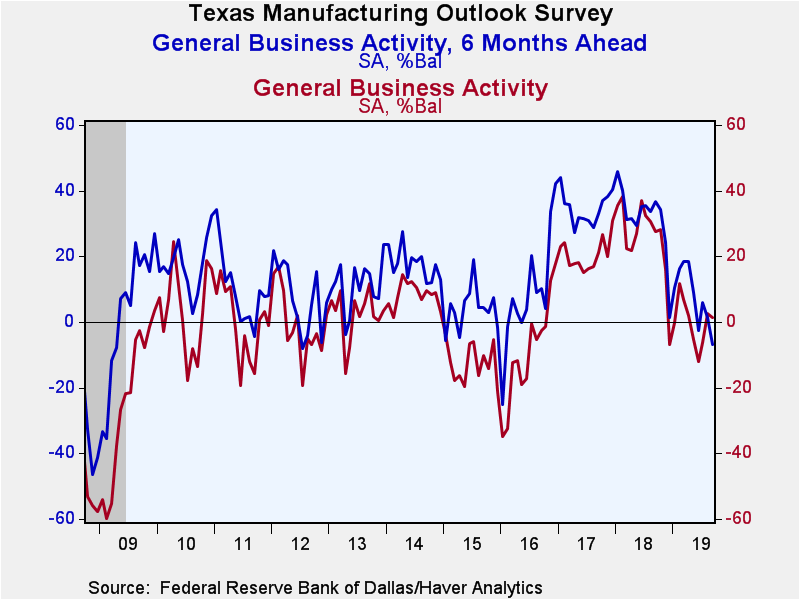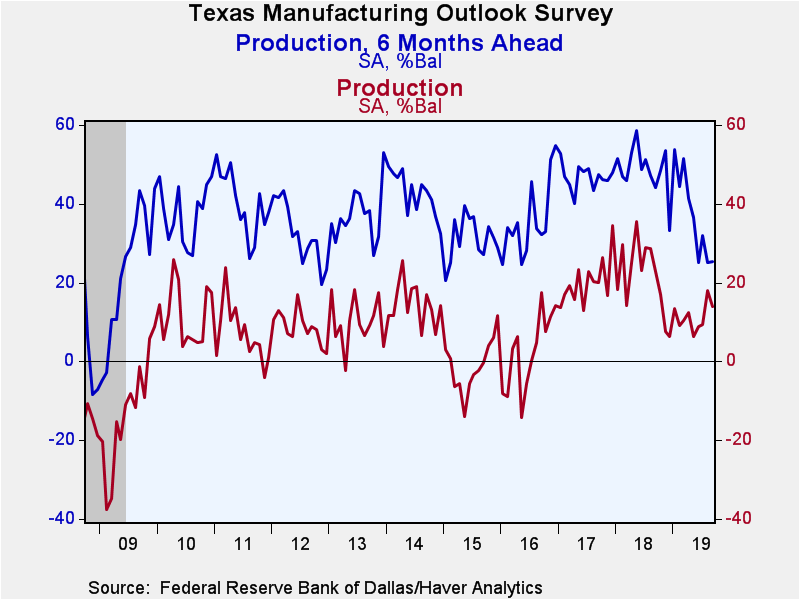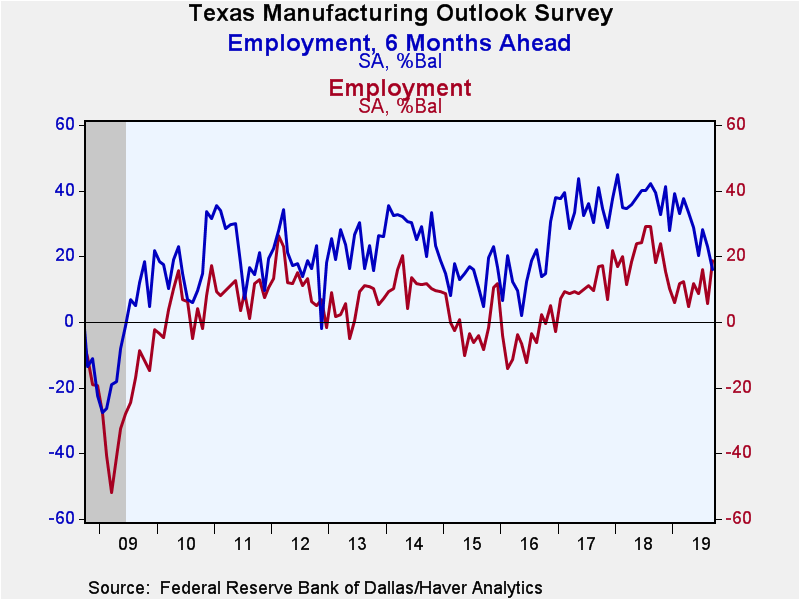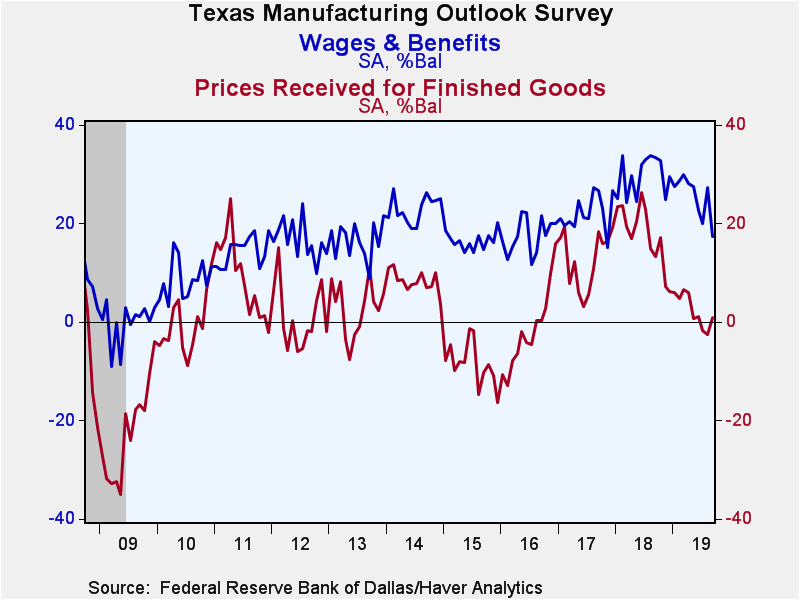 Global| Sep 30 2019
Global| Sep 30 2019Texas Factory Sector Activity Eases
by:Tom Moeller
|in:Economy in Brief
Summary
The Federal Reserve Bank of Dallas reported in its Texas Manufacturing Outlook Survey that the General Business Activity Index fell to 1.5 during September from 2.7 in July. It remained down sharply from the February 2018 high of 38.2 [...]
The Federal Reserve Bank of Dallas reported in its Texas Manufacturing Outlook Survey that the General Business Activity Index fell to 1.5 during September from 2.7 in July. It remained down sharply from the February 2018 high of 38.2 and near the lowest level in three years. During the last ten years, there has been a 67% correlation between the index level and the q/q change in year GDP.
The production diffusion index declined to 13.9 and remained well below the May 2018 high of 35.4. The wages & benefits reading declined to a two-year low of 17.4. The shipments index fell slightly to 14.7 but remained up from 1.7 in June. It was nearly the highest level in 12 months. Offsetting these declines, the diffusion index for new orders growth improved to the highest level since April. The employment index also strengthened to 18.8, up from April's low of 4.6. It was the highest level since October, 2018.
Inflation pressures remained contained. The finished goods prices received index rose to 1.0, but remained well below the reading of 13.3 one year earlier. It was well below the June 2018 high of 26.2. The prices paid index for raw materials gained slightly m/m to 20.3, but remained below the high of 54.3 in June 2018.
The index of expected business conditions in six months suggested coming deterioration with a decline to -6.8. It was the lowest level since January 2016, down from the January 2018 high of 45.7. The future shipments and employment readings collapsed. Hours-worked fell sharply while expected wages & benefits remained weak. Capital spending intentions stabilized after declining sharply versus the August 2018 high.
Each index is calculated by subtracting the percentage reporting a decrease from the percentage reporting an increase. When all firms report rising activity, an index will register 100. An index will register -100 when all firms report a decrease. An index will be zero when the number of firms reporting an increase or decrease is equal. Items may not add up to 100% because of rounding. Data for the Texas Manufacturing Outlook can be found in Haver's SURVEYS database.
| Texas Manufacturing Outlook Survey (SA, % Balance) | Sep | Aug | Jul | Sep'18 | 2018 | 2017 | 2016 |
|---|---|---|---|---|---|---|---|
| Current General Business Activity Index | 1.5 | 2.7 | -6.3 | 27.5 | 25.8 | 20.6 | -8.9 |
| Production | 13.9 | 17.9 | 9.3 | 22.7 | 21.4 | 20.2 | 2.4 |
| Growth Rate of New Orders | 4.4 | 1.8 | 2.7 | 11.4 | 14.8 | 11.4 | -7.3 |
| Employment | 18.8 | 5.5 | 16.0 | 18.0 | 20.0 | 11.4 | -4.9 |
| Wages & Benefits | 17.4 | 27.3 | 20.1 | 33.4 | 29.7 | 22.2 | 17.6 |
| Prices Received for Finished Goods | 1.0 | -2.6 | -1.7 | 13.3 | 17.6 | 12.7 | -1.6 |
| General Business Activity Index Expected in Six Months | -6.8 | 1.4 | 6.0 | 36.8 | 31.6 | 34.5 | 8.9 |
| Production | 25.4 | 25.0 | 31.9 | 44.2 | 48.5 | 46.8 | 35.8 |
| Growth Rate of New Orders | 18.8 | 14.8 | 30.7 | 37.3 | 35.9 | 37.7 | 24.3 |
| Employment | 15.9 | 22.9 | 28.2 | 39.3 | 37.6 | 35.2 | 16.7 |
| Wages & Benefits | 35.6 | 35.2 | 44.5 | 57.3 | 50.4 | 43.4 | 34.9 |
Tom Moeller
AuthorMore in Author Profile »Prior to joining Haver Analytics in 2000, Mr. Moeller worked as the Economist at Chancellor Capital Management from 1985 to 1999. There, he developed comprehensive economic forecasts and interpreted economic data for equity and fixed income portfolio managers. Also at Chancellor, Mr. Moeller worked as an equity analyst and was responsible for researching and rating companies in the economically sensitive automobile and housing industries for investment in Chancellor’s equity portfolio. Prior to joining Chancellor, Mr. Moeller was an Economist at Citibank from 1979 to 1984. He also analyzed pricing behavior in the metals industry for the Council on Wage and Price Stability in Washington, D.C. In 1999, Mr. Moeller received the award for most accurate forecast from the Forecasters' Club of New York. From 1990 to 1992 he was President of the New York Association for Business Economists. Mr. Moeller earned an M.B.A. in Finance from Fordham University, where he graduated in 1987. He holds a Bachelor of Arts in Economics from George Washington University.
More Economy in Brief
 Global| Feb 05 2026
Global| Feb 05 2026Charts of the Week: Balanced Policy, Resilient Data and AI Narratives
by:Andrew Cates










